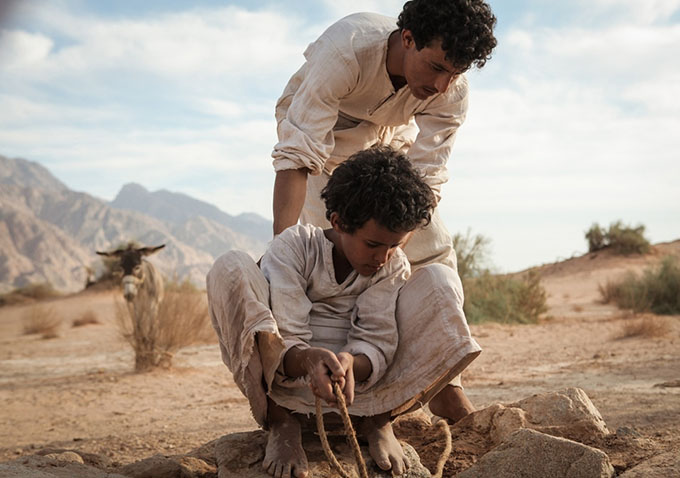 The prophetic lines that open Naji Abu Nowar‘s debut feature-length film, "Theeb," speak of true depths, brotherhood, and death. And for the next hour and forty minutes, the film delicately explores these three major forces through the eyes of Theeb (Jacid Eid), a young Bedouin boy growing up in the Ottoman province of Hejaz in 1916, while the rest of the world’s attention curled towards Europe and the First World War. With the support of a beautifully composed score by Jerry Lane, and Wolfgang Thaler‘s terrific cinematography, the atmosphere that pervades "Theeb" is one of unforced reverence. Elemental in construct and narrative, the picture breathes through the screen during Theeb’s moments of quiet reflection at his surroundings and all the cruelty the vast, all-encompassing desert has to offer.
The prophetic lines that open Naji Abu Nowar‘s debut feature-length film, "Theeb," speak of true depths, brotherhood, and death. And for the next hour and forty minutes, the film delicately explores these three major forces through the eyes of Theeb (Jacid Eid), a young Bedouin boy growing up in the Ottoman province of Hejaz in 1916, while the rest of the world’s attention curled towards Europe and the First World War. With the support of a beautifully composed score by Jerry Lane, and Wolfgang Thaler‘s terrific cinematography, the atmosphere that pervades "Theeb" is one of unforced reverence. Elemental in construct and narrative, the picture breathes through the screen during Theeb’s moments of quiet reflection at his surroundings and all the cruelty the vast, all-encompassing desert has to offer.
Theeb and his older brother Hussein (Hussein Salameh) are nomads in the Arabian desert, learning how to survive under the auspices of their oldest brother, the Sheikh (Hmood Ali). Hussein teaches Theeb how to shoot a rifle and how to properly slaughter a goat, but the trepidation in the young boy’s eyes at the sight and thought of death — instantly captured by the opening frame of the film, with Theeb pensively staring at a gravestone — tells us that he’s still got many lessons ahead of him. One dark evening, the tribe welcomes a group of men and a mysterious British soldier, Edward (Jack Fox), as guests under their tent. Edward is on a mission to reach his regiment by the Roman Well, and is need of local guides to help him reach his destination. The road they must take is known as The Pilgrim’s Trail, but as the Sheikh tells them, it’s populated by more raiders than pilgrims since it’s been abandoned to make way for a railway. In honor of their father, whose reputation brought the travelers to the Sheikh’s camp, Hussein is commissioned to lead Edward and his guides through the barren wilderness. Theeb, with a mix of curiosity and fear of being separated from Hussein, decides to follow them.

The skeletal construct of "Theeb" is, basically, a journey from point A to point B, and the events that shape this journey are best explored with fresh eyes. Suffice it to say that the expedition turns into something of an expedited coming-of-age tale for Theeb, who finds himself face to face with death in the real world much sooner then he’d imagined. What cannot be tiptoed over, though, is the unlikely relationship that develops between Theeb and one of the raiders (who turns out to be, in fact, a pilgrim) who remains unnamed throughout. Stoically Portrayed by Hassan Mutlag, this character is billed as The Stranger in the credits, but as the story develops, he plays the most vital of roles in Theeb’s development as a person, and as a man.
Naji Abu Nowar has successfully crafted a story that’s got the unmistakable vibes of a parable. Religion, though only directly referenced in passing, is tucked into the contours of "Theeb" like a silky pillowcase. Viewers most familiar with the history of the Hejaz region during WWI will take the most out of it, for 1916 isn’t just any odd year, but the precipice of The Arab Revolt. The region has always been something of a hotbed during times of war because that’s where the holy cities of Mecca and Medina are (hence, Pilgrim’s Trail). The character of Edward, also, is clearly a reference to the real-life Lawrence of Arabia and the MacMahon-Hussein Correspondence. The underlining point here is that "Theeb" is set at very specific time in history, and on hallowed ground, but concentrates all its power on a young, slightly bewildered boy who is prematurely forced to become a man. Viewers who are completely unfamiliar with the history and importance of the time and place in "Theeb," might not feel the extra weight of that concentrated force, but that’s not say they won’t be able to take anything away from the experience.

In craft and execution, the picture has zero trace of being a debut feature. Even the non-professional actors have a remarkable chemistry in front of the camera, and the dark brown buttons that are Jacid Eid’s eyes will make audience members empathetic in an instant. Lane’s score, like the song about the forsaken home near the beginning of the film that emphatically spills over into the next scene in VO, coats the film with a reverent layer. Thaler’s cinematography makes impressionable use of the vastness, and Nowar symbolically frames his characters against the mountainous backdrop — the final shot rank among the most painterly of the year. Without a trace of forcefulness, exposition, or stilted humor, "Theeb" is the kind of film cinephiles might choose over something like "Beasts Of No Nation," the more publicized coming-of-age wartime story of the year. On the flip side, though, the latter is much more accessible in terms of Western-style storytelling. In any case, "Theeb" is an arthouse gem that celebrates world cinema through a Middle Eastern perspective, and as an unfamiliar approach to familiar themes, should be lauded and sought out by those in the mood for some serious, and seriously good, cinema. [B+]

